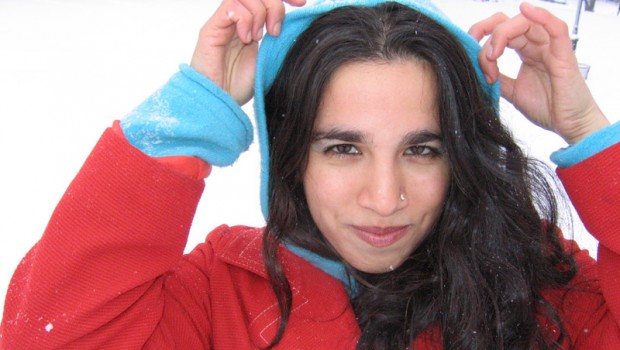In August, Bushra Rehman celebrated the launch of her first novel Corona (Sibling Rivalry Press). Corona was featured in Poets & Writers Best Debut Fiction issue. The Readings /Workshops Program co-funded the book event An Ode to Corona with the South Asian Women’s Creative Collective and Rehman’s writing workshop Two Truths and a Lie: Writing Autobiographical Fiction.
 The first question people always ask me about my novel Corona is if it’s true. Yes, like me the character is a Pakistani who grew up in Corona, Queens, worked as a Puritan in a living history museum, and hitchhiked up and down the East Coast in her twenties, but to say Razia’s life is my life is somehow still not true. Razia is Bushra 2.0: stronger, faster, smarter, quicker. She says all the things I wish I’d said. She doesn’t take as much bull crap. She’s me without the endless hours of agonizing, worrying, and being depressed. Also, most of the events in the book didn’t really happen.
The first question people always ask me about my novel Corona is if it’s true. Yes, like me the character is a Pakistani who grew up in Corona, Queens, worked as a Puritan in a living history museum, and hitchhiked up and down the East Coast in her twenties, but to say Razia’s life is my life is somehow still not true. Razia is Bushra 2.0: stronger, faster, smarter, quicker. She says all the things I wish I’d said. She doesn’t take as much bull crap. She’s me without the endless hours of agonizing, worrying, and being depressed. Also, most of the events in the book didn’t really happen.
Corona is a work of autobiographical fiction. It lives in that slippery place between memoir and fantasy. Autobiographical fiction skims the fat off the truth and then uses it to create rich buttery deserts for the reader’s pleasure. It recognizes that our lives are too fascinating not to write about and our imaginations too strong to ignore. Autobiographical fiction is an endless source of confusion for readers who want to know what really happened.
I’ll never forget the moment on Fresh Air, when Adrienne Rich schooled Terry Gross for asking the “biography question.” I sympathized with Gross because Rich had scolded me once, also with good reason, and it was scary. Rich, as always, was eloquent on the matter. She explained why the question upset her. Much of current literary criticism, she said, has devolved into a strange case of connect-the-dots between the writer’s life and work. The understanding of craft, of the writer’s use of language, is lost in these conversations.
I understood what Rich was saying. There’s an implication that autobiographical work is simply an advanced form of journaling. This couldn’t be further from the truth. When sharing a hilarious, creepy, or life-altering story, which might have really happened, the writer can’t stop halfway and say, “You just had to be there.” She must use all her skills to make readers feel they were there. Even more difficult, the writer must live the life first, a life of imagination, a life worthy of fiction.
As a Pakistani-American, the question of autobiography becomes more loaded. There are so few narratives available that readers grasp for straws. All too often, I’ve had people tell me that they just read a novel about a Pakistani woman who was forced into an arranged marriage or kidnapped by bandits and they think this is how all of our lives pan out. So I always add in my interviews that Corona is a work of fiction and not meant to represent the lives of all Pakistani women. All of us don’t dress up in Puritan costumes and work in recreated seventeenth century villages in Salem, Massachusetts.
This burden of representation, plus the fear of hurting our friends and family and adding to the racism in this country by airing our community’s dirty laundry, scares many writers of color away from writing their stories. For this reason, I developed the workshop "Two Truths and a Lie: Writing Memoir and Autobiographical Fiction." Last winter, the Readings/Workshop Program co-sponsored this class with the Asian American Writers’ Workshop. Tune in next week to read some of the tips I shared with my students to help them overcome their fears and write inspired by both the truth and lies of their lives.
Photo: Bushra Rehman. Credit: Jaishri Abichandani
Support for Readings/Workshops in New York City is provided, in part, by public funds from the New York State Council on the Arts and the New York City Department of Cultural Affairs, with additional support from the Louis & Anne Abrons Foundation, the Axe-Houghton Foundation, The Cowles Charitable Trust, the Abbey K. Starr Charitable Trust, and the Friends of Poets & Writers.







